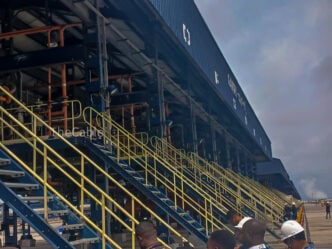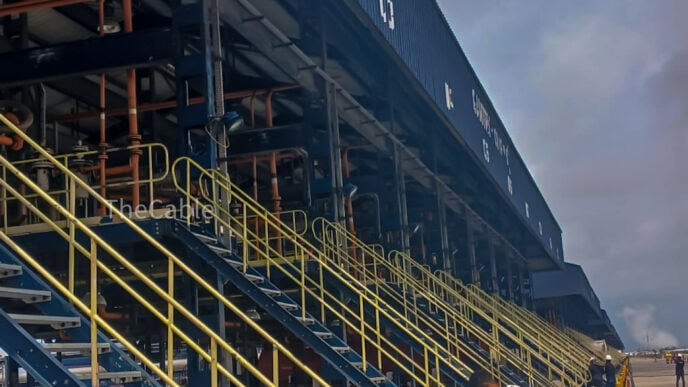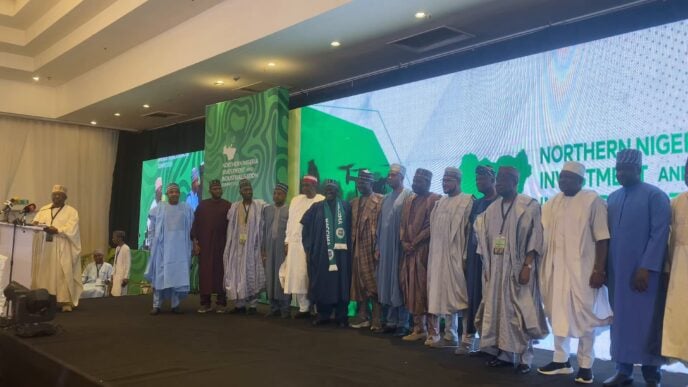BY ADEWALE-SMATT OYERINDE
The Nigerian industrial relations system has evolved through distinct historical phases, shaped by colonial legacies, post-independence reforms, economic transitions, and global labour dynamics. It is deemed as complex and often crisis-ridden due activities of the actors in industrial relations, their understanding and application of the knowledge of industrial relations.
It is fundamentally modelled after the British (Anglo-Saxon) system, characterised by tripartism (involving government, employers, and labour) and a mix of voluntarism and state interventionism. The history can be summarised into distinct phases, each leaving a permanent imprint on the current system:
The Colonial Era (Pre-1960): The Genesis
Advertisement
This period marked the shift from traditional/agrarian labour systems to wage employment, primarily in public works (railways, ports, mining), serving colonial economic interests.
Birth of Unions: The conditions of low wages, poor working environments, and racial discrimination spurred the formation of the first labour organisations, often rooted in specific crafts or government departments (e.g., Nigerian Civil Service Union, 1912).
Legal Framework: The British colonial administration introduced foundational labour legislation, partly influenced by the International Labour Organisation (ILO):
Trade Union Ordinance of 1938: Gave legal status to trade unions, laying the groundwork for collective bargaining.
Advertisement
Trade Disputes (Arbitration and Inquiry) Ordinance of 1941: Established the first state-led mechanism for dispute settlement.
Nationalism: The labour movement quickly became intertwined with the nationalist struggle for independence, giving unions significant political clout beyond industrial issues. The 1945 General Strike was a pivotal moment in this alliance.
The Golden Age of Voluntarism (1960–1966)
Following independence, the IRS adopted a largely voluntaristic approach, adhering to the Anglo-Saxon model where the state’s role was primarily to facilitate negotiations, not dictate terms.
Advertisement
Tripartism: The system relied heavily on collective bargaining between organised labour and employer associations (like NECA, founded in 1957) without undue state intervention.
Ad-Hoc Wage Reviews: Disputes over wages, particularly in the public sector, were frequently resolved through ad hoc commissions (e.g., Morgan, Elwood), setting a precedent for recurring, often politically charged, wage reviews.
The Era of Military Interventionism (1966–1999)
Military rule fundamentally altered the voluntary nature of the IRS, establishing a highly centralised and interventionist system designed to ensure “national stability” and control labour’s political power.
Advertisement
Centralisation of Unions: The military government engineered the restructuring and consolidation of trade unions, culminating in the creation of the Nigeria Labour Congress (NLC) in 1978, which became the sole central labour organisation.
Legalisation of Institutions: This era formalised the core dispute resolution mechanisms:
Advertisement
Trade Disputes Act of 1976: Introduced a rigid, step-by-step procedure for dispute resolution (Mediation, Conciliation, Industrial Arbitration Panel (IAP) National Industrial Court). Under this procedure, once the ministry of labour apprehends trade disputes, then the process of dispute settlement or resolution becomes mandatory.
National Industrial Court (NIC): Given its specialised jurisdiction over labour disputes, NIC was later elevated to the National Industrial Court of Nigeria (NICN) with superior court status through the 3rd Constitutional Alteration of 2010, a crucial development for judicial review.
Advertisement
“No-Work, No-Pay”: Legislative actions sought to severely restrict the right to strike, particularly in essential services, often met with stiff resistance from labour. Implementing this provision was always difficult, especially in the public sector, where the government serves as both employer and regulator
Structural Adjustment and Neo-Liberalism (1980s–2000s)
Advertisement
Economic crises led to the introduction of Structural Adjustment Programmes (SAPs), which introduced neo-liberal policies that clashed with the established interventionist framework.
Privatisation, commercialisation and downsizing policies: Government policies focused on privatisation and deregulation, leading to mass retrenchment and increasing labour hostility towards the state and its economic direction. This period also coincided with the era of globalisation, where multinational companies exerted political pressure on national governments to open up their borders and adopt flexible policies for foreign direct investment. The industrial relations atmosphere of this era was characterised by adversarial relations
Increased Conflict: Labour became highly politicised and confrontational, organising nationwide strikes against economic policies (like fuel price hikes) rather than solely focusing on enterprise-level collective bargaining.
The Democratic and Contemporary Era (1999–Present)
The return to democracy brought a theoretical restoration of civil liberties and the right to associate, but the IRS remains volatile.
Judicial Clarity: The NICN’s elevated status (through the 3rd Constitutional Alteration, 2010) has been a significant positive development, leading to clearer jurisprudence and enforcement of labour laws.
Persistent Crisis: Despite the legal framework, the system is dominated by frequent and disruptive industrial conflicts, particularly in essential sectors (health, education, power) and over national economic issues (minimum wage, subsidy removals).
Erosion of Trust: A lack of compliance with agreements and court rulings by all parties—especially the government as a major employer—continues to undermine institutional authority, pushing unions towards self-help rather than statutory mechanisms.
Current realities and an urgent call to action
Nigeria’s industrial relations system stands at a critical juncture. Over the years, the framework for managing employer–employee relations has evolved through legislation, collective bargaining, and tripartite dialogue. However, persistent challenges—ranging from weak enforcement of labour laws and politicisation of union activities to poor dispute resolution mechanisms—continue to undermine industrial harmony and productivity.
Overall, the Nigerian IRS is currently at a critical inflexion point, characterised by fragmentation, weakened institutional authority, and growing conflict stemming from severe economic pressure. Its trajectory is uncertain, leaning towards increased instability unless key and urgent reforms are implemented.
Key Challenges and Current Trajectory: Weakening of Institutional Authority
The foundation of the Nigerian IRS is built upon institutions like the Federal Ministry of Labour and Employment (FMLE), the Industrial Arbitration Panel (IAP), and the National Industrial Court of Nigeria (NICN).
Waning Respect: There is a visible and concerning trend among the Social Partners (Government, Employers, and Labour) to disregard or bypass statutory resolution processes (e.g., mandatory conciliation before strike action).
Contempt for Rulings: Instances where parties refuse to comply promptly with judgments from the IAP or NICN erode the authority of the judiciary and promote a culture of impunity and self-help.
Result: This institutional weakness leads to prolonged and unnecessary disputes, transforming manageable conflicts into national crises.
Economic Pressure and the Necessary Subsidy Removals
Recent macroeconomic policy changes, particularly the removal of the contentious and fraudulent fuel subsidies, have placed unprecedented stress on the IRS.
Erosion of Purchasing Power: High inflation has severely eroded workers’ purchasing power, making wage disputes more frequent, urgent, and difficult to resolve, as employers face parallel hikes in operational costs.
Focus on Survival: Labour unions often prioritise national economic protests (e.g., general strikes against government policy) over specific collective bargaining issues, blurring the lines between political activism and industrial relations.
Result: The traditional framework of collective bargaining is often overshadowed by national economic grievances, escalating local disputes to the federal level.
Fragmentation and Sectoral Chaos
While the formal sector has a relatively defined structure, the Nigerian IRS struggles to accommodate the complexities of the informal and “gig” economies.
Essential Services Crisis: The frequent use of strikes in essential services (such as healthcare, oil and gas, and education) poses a direct threat to national security and economic stability. This indicates a failure to enforce or renegotiate regulations governing these critical sectors.
Union Radicalisation: Faced with declining worker welfare, some unions adopt more confrontational, and at times, legally questionable tactics (e.g., secondary picketing, threats of economic sabotage, solidarity strikes) to achieve their aims.
Result: The system is inconsistent; highly regulated in some areas, but completely chaotic and unregulated in others, particularly concerning the rights of non-unionised workers.
The Path Forward: Revitalisation Imperatives
For the Nigerian Industrial Relations System to move toward stability and resilience, the following imperatives, among many others, must be addressed:
Upholding the Authority of Legal Institutions
Enforcement of NICN Rulings: The government must demonstrate unwavering political will to ensure the swift and full compliance with rulings from the NICN and IAP by all three Social Partners (Government, Employers, and Labour). The decisions of the NIC are not to be treated with levity but enforced to enhance the credibility of the Institution and its fundamental role. The alternative is simply chaos and resort to self-help by social partners.
Strengthening Mediation: The Government must invest in and professionalise the mediation and conciliation services offered by the Federal Ministry of Labour and Employment to resolve disputes before they escalate to strikes or court action. There should also be prompt referral of cases for arbitration where conciliation fails, to ensure speedy resolution of disputes.
Adapting to Economic Realities
Productivity-Based Bargaining: Shift the focus of collective bargaining and minimum wage negotiations from merely cost-of-living adjustments to productivity-linked wages and incentives. This ensures wage increases are sustainable for businesses. While employers are not averse to conversations on a living wage, there is a need to allow the ILO to arrive at an agreeable global parameter to determine it.
Targeted Social Safety Nets: The government must utilise savings from reforms (like subsidy removals) to build robust social safety nets that cushion the impact of inflation on the most vulnerable workers, reducing the need for nationwide industrial action over basic economic survival. Frontally addressing challenges around transportation, food security, healthcare, free and qualitative education, and housing will reduce pressure on households.
Urgent Review and Passage of Labour and Employment Bills into Law: It is unfortunate that after years of joint review of the Labour and Employment Bills by the social partners plus, the bills have not been considered and passed into law. This is an indictment on the federal government, especially the federal ministry of labour and employment. As a foremost member of the International Labour Organisation (ILO), it is expected that the government would leverage the commitment from social partners to conclude legislative action on the Bills and send them to the president for his assent.
The treatment of the labour laws reflects the disposition of those managing the labour and employment ecosystem to the IR system of the nation. In the labour laws, there is a need to:
Clearly define and enforce the protection of Essential Services: There is an urgent need to clearly and legally define the scope and limitations of industrial action in essential services, ensuring compliance while upholding workers’ fundamental rights.
Take cognisance of and incorporate the New Economy: The Labour law, even at its current point need to be updated to address the reality of the gig economy, platform economy, remote work, and non-standard employment contracts, ensuring protection and defining rights for a new generation of workers, etc.
Current realities of the world of work: While we continue to impede and frustrate the development of our Industrial Relations System, the world is moving ahead, with updated laws addressing new challenges and proffering future-ready solutions to challenges that they anticipate would happen.
National growth and development: Nigeria’s industrial relations system stands at a crossroads. To ensure stability, productivity, and decent work, there is a pressing need to:
- Strengthen institutions for social dialogue and collective bargaining.
- Enforce labour laws transparently and impartially.
- Enforce continuous education and capacity building for Unions and Employers’ Associations.
- Continuously foster trust, consultation, and mutual respect among Tripartite partners – government, employers, and workers.
Conclusion
The Nigerian IRS is currently floundering due to institutional erosion and economic strain. The immediate trajectory points toward greater conflict and instability. However, the system is not beyond redemption. Its future hinges on the immediate reassertion of the rule of law, particularly respecting the Institutions it created, coupled with a fundamental commitment from all social partners to prioritise national economic stability and enterprise sustainability over disruptive unilateral action. The reality remains that without economic stability and enterprise sustainability, decent jobs will not be created, the economy will not grow, and citizens will be hard-pressed.
It is critical that the federal government give due attention to the federal ministry of labour and adequately fund it to effectively perform its fundamental role of managing the ecosystem. The need to support the ministry to enhance its professionalism and competence across all ministries, departments and agencies of government, at the three tiers of government and in the private sector cannot be overemphasised.
It is also worrisome that the National Labour Advisory Council (NLAC), the supposed overall authority on labour matters in Nigeria, fashioned like the NEDLAC in South Africa, remained comatose and unable to fulfil its role. It is hoped that urgent action will be taken to resuscitate the NLAC as a national platform to promote a peaceful industrial relations system.
Having ratified about 44 ILO Conventions (making it a significant signatory to international labour standards), including the ten Fundamental Conventions, which are considered legally binding principles and rights at work, Nigeria walks precariously on the path of ridicule in the comity of ILO member-states.
The future of Nigeria’s economy depends not only on sound fiscal policies but also on a fair, predictable, and inclusive industrial relations framework—one that prioritises national development through cooperation, consultation and respect for the rule of law, among many others..
Thank you.
Adewale-Smatt Oyerinde is the director-general/CE, NECA, and member, International Labour Organisation Governing Body
Views expressed by contributors are strictly personal and not of TheCable.










